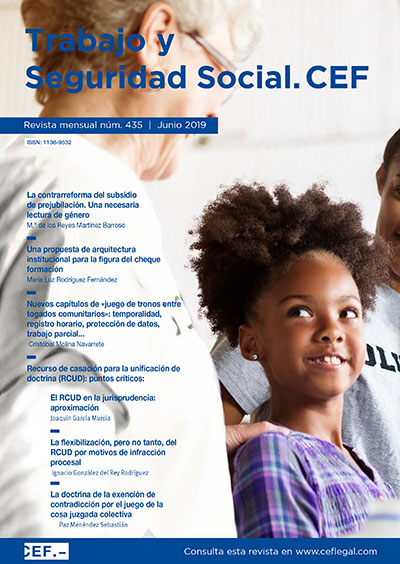New chapters of the endless series «game of thrones among European judges»: temporary work, registration of the working day, data protection, partial work...
DOI:
https://doi.org/10.51302/rtss.2019.1280Keywords:
Court of Justice of the European Union, European judges, temporary work, registration of the working day, data protection, partial workAbstract
Because of the principle of stronger linking of national judges to EU law and to the case law of the European Court of Justice, the production of Labor Law –and of Social Security Law– is increasingly due to a judicial creation process («judge-made-law»). This new model of diffuse control of the supralegal legitimacy of national norms has a positive effect: legal dynamism and innovation. However, at the same time, that plural model encourages a plus of unpredictability of the law applicable to cases. This appears in the eyes of the subjects of labor relations continually subject to review through the dialogue between the national community judges and the Court of Justice of the European Union. The result of this system of jurisdictional protection of the social rights of workers, multilevel and dialectic, made with plural voices, without a choral voice, is closer to the permanent conflict between the various levels than a fertile dialogue.
In recent times, very relevant issues of labor relations in Spain, such as control measures of temporary abuse, control of working time, data protection, dismissal for absenteeism, part-time work and other they have been intensely affected by this dialectical and unpredictable way of interpreting and recreating labor and social norms. This analysis of legal-social novelties proposes a complete exposition of the most relevant judicial cases (precedents) and a deep criticism of the cases that lack the necessary legal rigor, the only way to guarantee a prudent use of the prejudicial question as a new source of creation Labor Law based on the method of the Community precedent.
Downloads
References
Molina Navarrete, C. (2016). La reforma laboral a juicio de los tribunales. Madrid: La Ley Wolters Kluwer.
Molina Navarrete, C. (2017). El nuevo ET a la luz de la jurisprudencia comunitaria. Madrid: La Ley Wolters Kluwer.
Molina Navarrete, C. (2019). «Juego de tronos» entre «togados comunitarios»: «nuevas batallas» por la «última palabra jurídica» en materia sociolaboral. Revista de Trabajo y Seguridad Social. CEF, 430, 101-141.
Rojo Torrecilla, E. (12 de abril de 2019a). Despido colectivo e indemnización por fin de contrata. Sobre la distinta cuantía para trabajadores temporales e indefinidos. ¿Ha entendido el TJUE la cuestión prejudicial formulada por el TSJ de Galicia? Notas a la sentencia de 11 de abril de 2019 (asuntos C-29, 30 y 44/18), y breve mención a tres más dictadas en la misma fecha. [Entrada en un blog]. Recuperado de http://www.eduardorojotorrecilla.es/2019/04/despido-colectivo-e-indemnizacion-por.html (consultado el 13 de abril de 2019).
Rojo Torrecilla, E. (25 de abril de 2019b). El TSJ de Castilla-La Mancha confirma que existe discriminación cuando se procede al despido de un trabajador por bajas en el trabajo que derivan de su estado de discapacidad. Notas a la sentencia de 10 de abril de 2019, y recordatorio de las sentencias del TJUE y del JS. Recuperado de http://www.eduardorojotorrecilla.es/2019/04/el-tsj-de-castilla-la-mancha-confirma.html (consultado el 25 de abril de 2019).
Rojo Torrecilla, E. (29 de abril de 2019c). Sigue la saga universitaria. La importancia de la sentencia del TS de 28 de enero de 2019 (falsos asociados), seguida por las de los TSJ de Galicia (22 de marzo de 2019) y Castilla-La Mancha (20 de marzo de 2019). [Entrada en un blog]. Recuperado de http://www.eduardorojotorrecilla.es/2019/04/sigue-la-saga-universitaria-la.html (consultado el 25 de marzo de 2019).



















